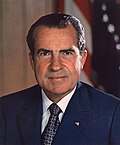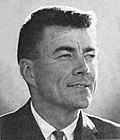Overview of the race
Nixon was a popular incumbent president in 1972, as he seemed to have reached détente with China and the USSR. He shrugged off the first glimmers of that, after the election, because of the massive Watergate scandal.
Polls showed that Nixon had a strong lead. He was challenged by two minor candidates, liberal Pete McCloskey of California and conservative John Ashbrook of Ohio. McCloskey ran as an anti-Vietnam war candidate dedicated to a much more clearly liberal position compared to Nixon's ambiguity approach within the party, while Ashbrook was dedicated to a much more clearly conservative position than Nixon and opposed Nixon's détente policies towards China and the Soviet Union. In the New Hampshire primary McCloskey's platform of peace garnered 19.7% of the vote to Nixon's 67.9%, with Ashbrook receiving 10.9% and comedian Pat Paulsen receiving 1.1%. [10] Having previously stated that he would withdraw from the race had he not achieved 20% of the vote, McCloskey did so.
Nixon won 1,347 of the 1,348 delegates to the GOP convention, with McCloskey receiving the vote of one delegate from New Mexico. [11]
This page is based on this
Wikipedia article Text is available under the
CC BY-SA 4.0 license; additional terms may apply.
Images, videos and audio are available under their respective licenses.








